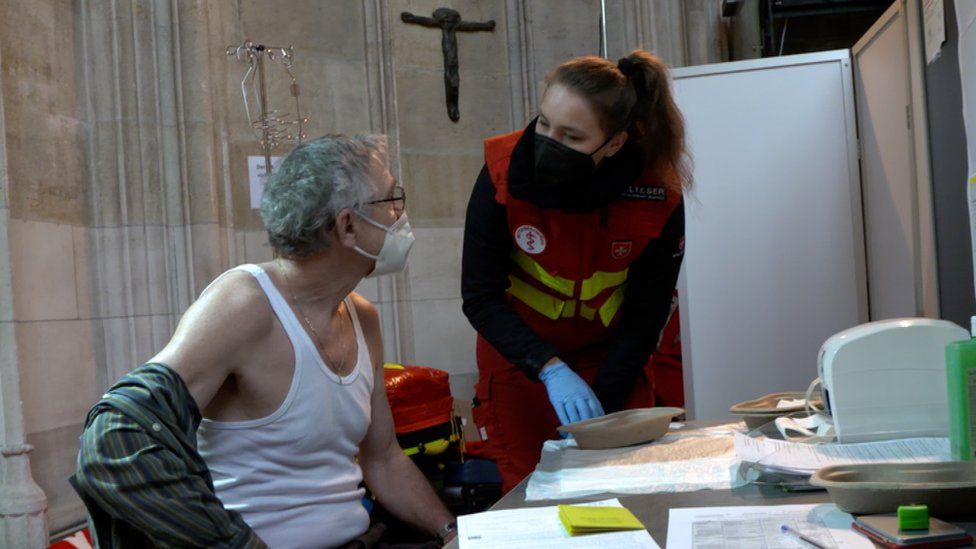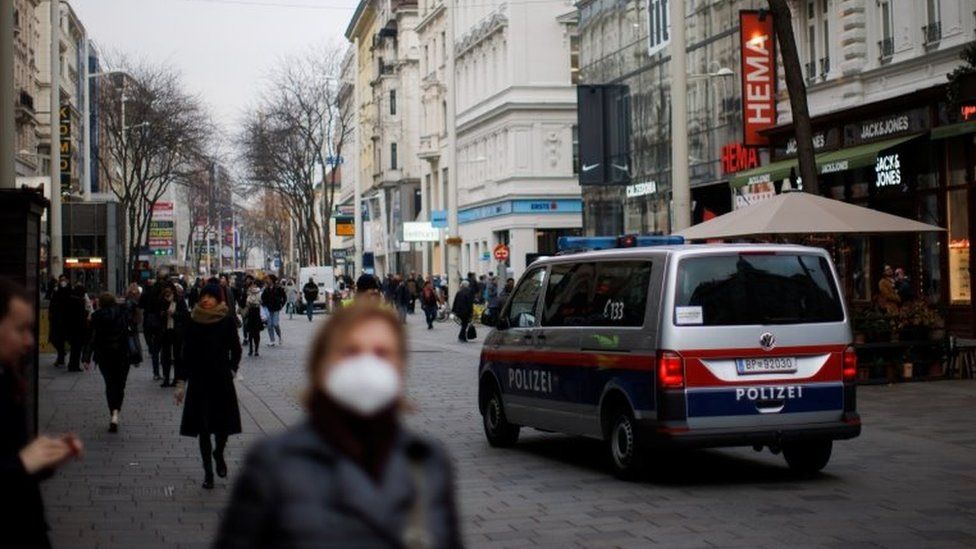SharecloseShare pageCopy linkAbout sharingA new law comes into force in Austria this week that makes vaccination against Covid-19 compulsory for anyone over-18. Several countries have introduced mandates for the elderly or medical staff, but this is the first nation in Europe to adopt such sweeping measures. LOu Moser, a ceramic artist who lives south of Vienna, is not vaccinated against Covid-19 and neither is her husband, Gus. They strongly disagree with Austria’s new vaccine mandate.Vaccination, she says, should be a personal choice. “I’ve had Covid-19. And so I actually don’t see the point of being jabbed when I’ve got sufficient antibodies,” LOu tells me. “And so I chose not to get vaccinated. And it’s not for any authority to tell me what to put into my body.””It has shown that the vaccines haven’t really stopped the pandemic yet,” LOu says.BBCPeople keep being vaccinated, and they’re still getting ill from Covid-19. Maybe not as badly, but they’re still getting ill.LOu MoserAustrian ceramic artistAustria’s government says vaccinations are effective at combating severe disease, and that the law is needed to prevent future lockdowns. Karoline Edtstadler, minister for the EU and Constitution, says the government is “very aware that it is really a strong step and really hard measure”.But, she says, it is necessary. BBCWe as politicians have the responsibility to be sure that the healthcare system is still working, that society, as a whole, can live normallyKaroline EdtstadlerMinister for EU and ConstitutionShe says, though, that mandatory vaccination is an “interference with human rights”. “But in this case, this interference can be justified,” she adds. “We have the need to get out of the pandemic and we know that vaccination is the only way to get out of it and to get back to a normal life.”Image source, Getty ImagesThe vaccine mandate, she says, will expire in January 2024, and could be ended earlier if the pandemic allows. The law comes into force on 3 February, but the authorities will not start checking people’s vaccination status until mid-March. Those who refuse to get the shot will face fines ranging from €600 (£500; $670) to €3,600. Exceptions apply for those who cannot get vaccinated for medical reasons or who are pregnant. About 72% of Austrians are fully vaccinated. At a vaccination centre at Vienna’s St Stephan’s cathedral, Carlos is having a booster shot. It was an easy decision, he says. “I wanted to get vaccinated because I want to protect my family and the people I know,” he tells me. “I want to travel and it’s for me easier when I’ve been vaccinated for the third time.”Dr Klaus Markstaller, head of Department of Anaesthesia and Intensive Care at the Medical University of Vienna and the city’s biggest hospital, says the vaccine saves lives.”It’s clearly shown that the vaccination impedes severe courses of the disease, and therefore it reduces ICU admissions significantly,” he says. “So if you want to reduce your personal risk significantly, and the risk for your loved ones, get vaccinated.”Image source, Getty ImagesSome Austrians are wondering how strictly the law will be enforced. Thomas Hofer, a political analyst, says it all depends on how Covid-19 spreads in the future. “I think a lot of people hope that this won’t be as strict as the government proposed in the first place. I think there’s some kind of Austrian solution, which means, you’re never carrying it the whole way through,” he says.”Even the government might think, okay, maybe in March or April, it’s not necessary anymore. But it depends on how the pandemic develops, if it comes back in the autumn and winter.”But strong resistance to the vaccine mandate remains. The far-right, anti-vaccine Freedom Party says it will fight the measure in court. Its leader, Herbert Kickl, has said the law “paves the way to totalitarianism in Austria”.Many opponents of the law are taking to the streets. Demonstrators from many different parts of society have protested, week after week, against mandatory vaccinations and Covid-related restrictions. CONTEXT: Mandatory jabs: Three reasons for and againstIN CHARTS: Tracking the pandemicAt a protest in Vienna on Saturday, one woman told me she was pleased to be vaccinated but opposed compulsory jabs. On a podium behind her, an anti-vaxxer told a cheering crowd the Covid-19 vaccine was “the biggest genocide” in history.Austria has gone farther than any of its neighbours with this vaccine mandate. Other European countries will be watching closely.
Read more →



